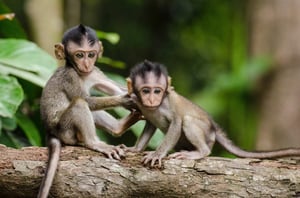Scientists in China have successfully cloned monkeys using the same method that produced Dolly the sheep in the late '90s. Though this is not the first time a primate has been cloned, it is the first time this method, a complex system that allows for many replicates, has been applied. Named Zhong Zhong and Hua Hua, the monkeys were the only two to survive out of the sixty that were implanted.
Cloning has been a controversial ethical topic for decades, and this case is no exception. With research getting closer and closer to replicating humans, the moral implications of cloning are more relevant than ever. Vatican officials have advised caution, saying we must "evaluate the risks" of such research.
Scientists claim this research may provide a better understanding of diseases such as autism, Parkinson's, Alzheimer's and Huntington's. With this new success, the Chinese government plans to increase the size of the project. Muming Poo, a scientist involved in the research, predicts twenty to thirty more facilities will be cloning monkeys within the next five years.
But some question the usefulness of such experiments. According to Science Magazine, Alan Trounson, a stem cell researcher at the Hudson Institute for Medical Research, has his doubts. "It's a good piece of science," says Trounson, "[But] I can't see a high desire to use cloned monkeys for research." He goes on to say that monkeys are expensive, researchers prefer to use alternate testing subjects, and pharmaceuticals no longer require primate testing.
As reported in Crux, Archbishop Vincenzo Paglia, the president of the Vatican’s Academy for Life, claimed that such technology should only be used “at the service of effective human development, and therefore respecting all dimensions that are proper to human life...” He also warned about treating animals humanely, stating that such experiments should only be employed "in the absence of alternative methods in acquiring knowledge and therapeutic tools.”
Paglia’s assertions fall in line with other official Church statements. In 1997, the Vatican responded to the cloning of Dolly the sheep saying, “there is a place for research, including cloning, in the vegetable and animal kingdoms, wherever it answers a need or provides a significant benefit for man or for other living beings, provided that the rules for protecting the animal itself and the obligation to respect the biodiversity of species are observed.”
As for human cloning, the Catholic Church has long condemned it as morally unacceptable. The encyclical Donum Vitae states, "attempts or hypotheses for obtaining a human being without any connection with sexuality through "twin fission", cloning or parthenogenesis are to be considered contrary to the moral law, since they are in opposition to the dignity both of human procreation and of the conjugal union."
